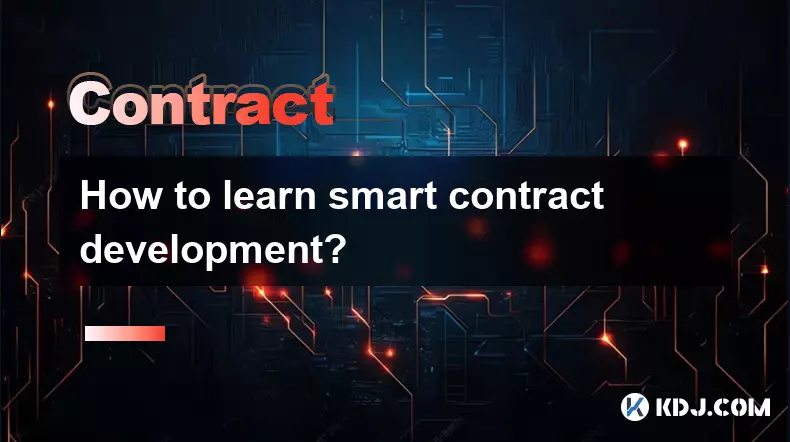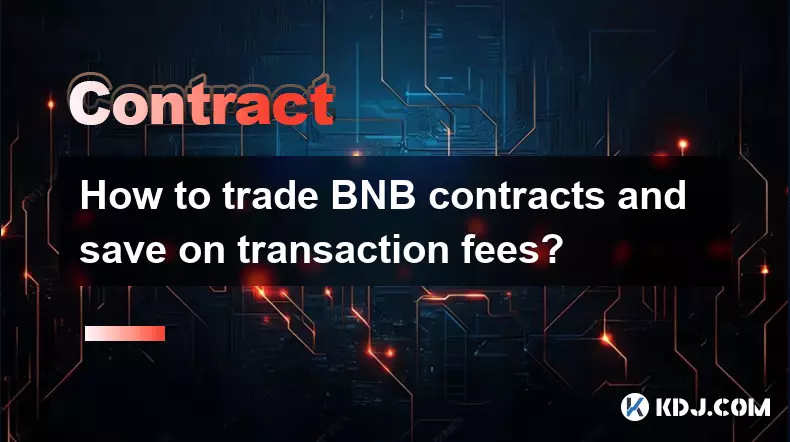-
 bitcoin
bitcoin $87959.907984 USD
1.34% -
 ethereum
ethereum $2920.497338 USD
3.04% -
 tether
tether $0.999775 USD
0.00% -
 xrp
xrp $2.237324 USD
8.12% -
 bnb
bnb $860.243768 USD
0.90% -
 solana
solana $138.089498 USD
5.43% -
 usd-coin
usd-coin $0.999807 USD
0.01% -
 tron
tron $0.272801 USD
-1.53% -
 dogecoin
dogecoin $0.150904 USD
2.96% -
 cardano
cardano $0.421635 USD
1.97% -
 hyperliquid
hyperliquid $32.152445 USD
2.23% -
 bitcoin-cash
bitcoin-cash $533.301069 USD
-1.94% -
 chainlink
chainlink $12.953417 USD
2.68% -
 unus-sed-leo
unus-sed-leo $9.535951 USD
0.73% -
 zcash
zcash $521.483386 USD
-2.87%
How to learn smart contract development?
Mastering smart contract development requires understanding blockchain fundamentals, proficiency in Solidity or Vyper, hands-on testing with tools like Hardhat, and rigorous security practices to prevent vulnerabilities and optimize gas usage.
Sep 09, 2025 at 02:18 am

Understanding the Foundation of Smart Contracts
1. Smart contract development begins with a solid understanding of what smart contracts are—self-executing agreements with the terms directly written into code. These contracts run on blockchain networks, primarily Ethereum, and automatically enforce and execute agreements when predefined conditions are met.
2. To grasp the fundamentals, developers must familiarize themselves with blockchain technology, including decentralized networks, consensus mechanisms like Proof of Stake, and the immutability of data on-chain.
3. Learning how transactions are structured, how gas fees work, and how accounts (externally owned and contract accounts) interact is crucial for writing efficient and secure smart contracts.
4. A working knowledge of cryptography, public-key infrastructure, and hash functions supports a deeper comprehension of how data integrity and ownership are maintained within smart contracts.
5. Engaging with blockchain explorers like Etherscan allows developers to inspect real smart contracts, trace transactions, and understand on-chain behavior in practice.
Mastering the Required Programming Languages
1. The primary language for Ethereum smart contract development is Solidity, an object-oriented language designed specifically for writing smart contracts. It shares syntactic similarities with JavaScript, making it accessible for web developers.
2. Developers should become proficient in Solidity’s core features: data types, functions, modifiers, events, structs, and inheritance. Understanding how to manage state variables and storage efficiently is essential.
3. Vyper, a Python-inspired alternative to Solidity, offers a more security-focused and simplified syntax. It is gaining traction among developers who prioritize readability and auditability over advanced features.
4. Learning to write clean, modular, and testable code in either language is vital, as poorly written contracts can lead to irreversible exploits and financial losses.
5. Familiarity with JavaScript or TypeScript becomes necessary when building front-end interfaces that interact with smart contracts using libraries like ethers.js or web3.js.
Building and Testing Contracts in Practice
1. Setting up a development environment using tools like Hardhat or Foundry enables developers to compile, deploy, test, and debug smart contracts locally before going live.
2. Writing comprehensive unit tests using frameworks such as Waffle or Chai ensures that contract logic behaves as expected under various conditions, including edge cases and potential attack vectors.
3. Utilizing testnets like Sepolia or Goerli allows developers to deploy contracts in a real-world-like environment without risking actual funds.
4. Integrating automated testing pipelines and coverage tools helps maintain code quality and identify vulnerabilities early in the development cycle.
5. Interacting with deployed contracts via scripts or user interfaces reinforces the connection between on-chain logic and off-chain applications.
Frequently Asked Questions
What tools are essential for smart contract development?Hardhat, Foundry, Remix IDE, MetaMask, and Etherscan are among the most widely used tools. Hardhat provides a comprehensive development environment, while Remix offers a browser-based IDE ideal for beginners. Foundry excels in performance and scripting capabilities, especially for advanced users.
How do I secure my smart contracts against common vulnerabilities?Adopt security best practices such as input validation, avoiding reentrancy with checks-effects-interactions patterns, using established libraries like OpenZeppelin, and conducting third-party audits. Regularly consult resources like the SWC Registry and ConsenSys Diligence for known attack patterns.
Can I develop smart contracts without prior blockchain experience?Yes, but a structured learning path is necessary. Start with blockchain basics, move to Solidity, practice on testnets, and gradually build full-stack decentralized applications. Numerous free tutorials, documentation, and community forums support self-guided learning.
What role does gas optimization play in smart contract development?Gas represents the computational cost of executing operations on Ethereum. Efficient code reduces gas consumption, lowering transaction fees and improving user experience. Techniques include minimizing storage writes, using appropriate data types, and optimizing loops and function calls.
Disclaimer:info@kdj.com
The information provided is not trading advice. kdj.com does not assume any responsibility for any investments made based on the information provided in this article. Cryptocurrencies are highly volatile and it is highly recommended that you invest with caution after thorough research!
If you believe that the content used on this website infringes your copyright, please contact us immediately (info@kdj.com) and we will delete it promptly.
- The Epstein Files & Satoshi's Shadow: Emails Exposed, Crypto's Past Reimagined
- 2026-02-03 12:35:01
- BlockDAG's $450M+ Presale Countdown: The 100x Opportunity About to Vanish
- 2026-02-03 12:50:01
- Coast Mountain Transit Workers Kick Off Bargaining, Demanding Fair Wages and Safer Conditions
- 2026-02-03 09:55:01
- Trump, Cryptocurrency, Unprecedented Claim: A Digital Divide in the Empire State
- 2026-02-03 10:00:02
- Natural Gas Prices Plummet Amid Warmer Forecasts, Supply Rebound
- 2026-02-03 09:50:01
- Michael Saylor's $54 Billion Bitcoin Gamble Faces Maturity Wall Amidst Shifting Crypto Landscape
- 2026-02-03 09:45:01
Related knowledge

How to close a crypto contract position manually or automatically?
Feb 01,2026 at 11:19pm
Manual Position Closure Process1. Log into the trading platform where the contract is active and navigate to the 'Positions' or 'Open Orders' tab. 2. ...

How to understand the impact of Bitcoin ETFs on crypto contracts?
Feb 01,2026 at 04:19pm
Bitcoin ETFs and Market Liquidity1. Bitcoin ETFs introduce institutional capital directly into the spot market, increasing order book depth and reduci...

How to trade DeFi contracts during the current liquidity surge?
Feb 01,2026 at 07:00am
Understanding Liquidity Dynamics in DeFi Protocols1. Liquidity surges in DeFi are often triggered by coordinated capital inflows from yield farming in...

How to use social trading to copy crypto contract experts?
Feb 02,2026 at 07:40am
Understanding Social Trading Platforms1. Social trading platforms integrate real-time market data with user interaction features, enabling traders to ...

How to trade BNB contracts and save on transaction fees?
Feb 03,2026 at 12:39am
Understanding BNB Contract Trading Mechanics1. BNB contracts are derivative instruments traded on Binance Futures, allowing users to gain leveraged ex...

How to build a consistent crypto contract trading plan for 2026?
Feb 02,2026 at 10:59pm
Defining Contract Specifications1. Selecting the underlying asset requires evaluating liquidity depth, historical volatility, and exchange support acr...

How to close a crypto contract position manually or automatically?
Feb 01,2026 at 11:19pm
Manual Position Closure Process1. Log into the trading platform where the contract is active and navigate to the 'Positions' or 'Open Orders' tab. 2. ...

How to understand the impact of Bitcoin ETFs on crypto contracts?
Feb 01,2026 at 04:19pm
Bitcoin ETFs and Market Liquidity1. Bitcoin ETFs introduce institutional capital directly into the spot market, increasing order book depth and reduci...

How to trade DeFi contracts during the current liquidity surge?
Feb 01,2026 at 07:00am
Understanding Liquidity Dynamics in DeFi Protocols1. Liquidity surges in DeFi are often triggered by coordinated capital inflows from yield farming in...

How to use social trading to copy crypto contract experts?
Feb 02,2026 at 07:40am
Understanding Social Trading Platforms1. Social trading platforms integrate real-time market data with user interaction features, enabling traders to ...

How to trade BNB contracts and save on transaction fees?
Feb 03,2026 at 12:39am
Understanding BNB Contract Trading Mechanics1. BNB contracts are derivative instruments traded on Binance Futures, allowing users to gain leveraged ex...

How to build a consistent crypto contract trading plan for 2026?
Feb 02,2026 at 10:59pm
Defining Contract Specifications1. Selecting the underlying asset requires evaluating liquidity depth, historical volatility, and exchange support acr...
See all articles

























![Discontinuum by: ArchitechGD 100% (1 coin) (Mobile) Geometry Dash [2.2] Discontinuum by: ArchitechGD 100% (1 coin) (Mobile) Geometry Dash [2.2]](/uploads/2026/02/03/cryptocurrencies-news/videos/origin_69814d99e6b61_image_500_375.webp)
















































